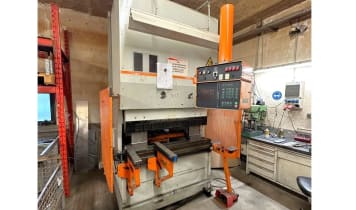A press brake is used to bend and shape sheet materials. It is a press, which uses a matching punch and die to bend the materials needed for the production of machinery components, cladding and casing. It can also be referred to as a folding press, bending press or break forming press.
- Often called a folding press or bending press
- Enables sheet materials to be bent into shape
- Used in the manufacture of furniture, doors or cladding for electrical components
Quality Great offers Personalized
Lowering the punch presses the sheet or panel into a recess, which bends it into the desired shape. Repositioning the sheet and repeatedly lowering the punch enables the production of complex profiles without the press brake having to be set up for this purpose. ‘Air-bending’ is the most frequently used procedure because it allows the operator to create a variety of angles without needing to change the tool. ‘Bottoming’ produces excellent results but can only be used to create one bend angle. ‘Three-point bending’ is also more precise and, depending on the press brake equipment, the tool does not need to be changed for different angles. Folding an envelope shape happens in two steps: first with pre-punching via air-bending, and the subsequent pressing procedure in the second step.
DURMA Press brake in operation








